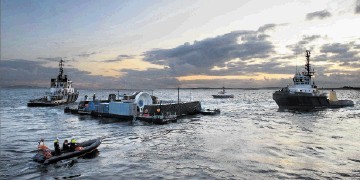
Orkney’s European Marine Energy Centre (Emec) and Edinburgh’s Heriot-Watt University have teamed up to tackle a “major concern to industries working in the marine environment”.
The project – involving Emec, Heriot-Watt’s energy academy and the university’s Stromness-based International Centre of Island Technology (Icit) – aims to find a solution to biofouling, or the settlement and growth of organisms on submerged structures.
Biofouling organisms on marine-energy converters are of particular concern as they may decrease generating efficiency and accelerate corrosion of metals, reducing the lifespan of technology.
Initial field research was carried out at Emec’s wave and tidal-energy test sites to identify common fouling organisms found in Orkney waters.
Icit is looking to build on the study to identify innovative solutions.
Joanne Porter, associate professor of marine biology at Icit, said: “Further work is needed to understand how the timing of settlement of these types of organisms could impact the fouling of artificial structure deployment and maintenance schedules.
“Biofouling is a ubiquitous problem for any industry putting structures or vessels into the marine environment, however, there are specific issues regarding biofouling for the marine renewable-energy industry.
“By sharing data with other test centres we can build up a clearer picture to fill any knowledge gaps and help marine-energy developers using these facilities drive down the cost of energy from their technology”.
Emec senior business development manager Matthew Finn added: “Ideally, we’d like to develop a map of biofouling in key strategic areas for the marine industries around Orkney and then expand it to include other key marine renewables sites around the world.”
Recommended for you
